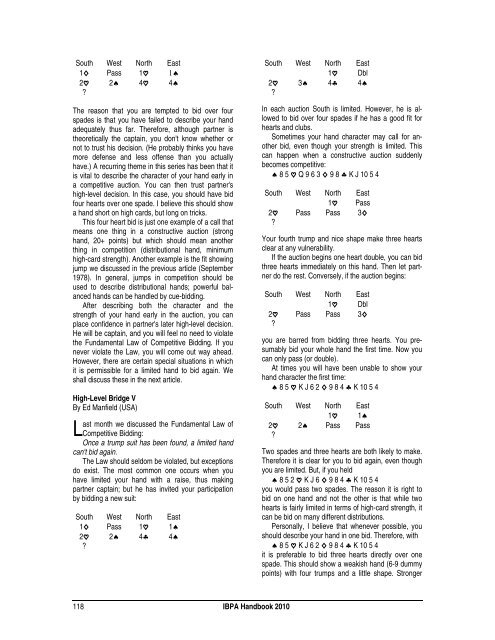Handbook - International Bridge Press Association
Handbook - International Bridge Press Association
Handbook - International Bridge Press Association
Create successful ePaper yourself
Turn your PDF publications into a flip-book with our unique Google optimized e-Paper software.
South West North East<br />
1 Pass 1 1♠<br />
2 2♠ 4 4♠<br />
?<br />
The reason that you are tempted to bid over four<br />
spades is that you have failed to describe your hand<br />
adequately thus far. Therefore, although partner is<br />
theoretically the captain, you don't know whether or<br />
not to trust his decision. (He probably thinks you have<br />
more defense and less offense than you actually<br />
have.) A recurring theme in this series has been that it<br />
is vital to describe the character of your hand early in<br />
a competitive auction. You can then trust partner's<br />
high-level decision. In this case, you should have bid<br />
four hearts over one spade. I believe this should show<br />
a hand short on high cards, but long on tricks.<br />
This four heart bid is just one example of a call that<br />
means one thing in a constructive auction (strong<br />
hand, 20+ points) but which should mean another<br />
thing in competition (distributional hand, minimum<br />
high-card strength). Another example is the fit showing<br />
jump we discussed in the previous article (September<br />
1978). In general, jumps in competition should be<br />
used to describe distributional hands; powerful balanced<br />
hands can be handled by cue-bidding.<br />
After describing both the character and the<br />
strength of your hand early in the auction, you can<br />
place confidence in partner's later high-level decision.<br />
He will be captain, and you will feel no need to violate<br />
the Fundamental Law of Competitive Bidding. If you<br />
never violate the Law, you will come out way ahead.<br />
However, there are certain special situations in which<br />
it is permissible for a limited hand to bid again. We<br />
shall discuss these in the next article.<br />
High-Level <strong>Bridge</strong> V<br />
By Ed Manfield (USA)<br />
L<br />
ast month we discussed the Fundamental Law of<br />
Competitive Bidding:<br />
Once a trump suit has been found, a limited hand<br />
can't bid again.<br />
The Law should seldom be violated, but exceptions<br />
do exist. The most common one occurs when you<br />
have limited your hand with a raise, thus making<br />
partner captain; but he has invited your participation<br />
by bidding a new suit:<br />
South West North East<br />
1 Pass 1 1♠<br />
2 2♠ 4♣ 4♠<br />
?<br />
118 IBPA <strong>Handbook</strong> 2010<br />
South West North East<br />
1 Dbl<br />
2 3♠ 4♣ 4♠<br />
?<br />
In each auction South is limited. However, he is allowed<br />
to bid over four spades if he has a good fit for<br />
hearts and clubs.<br />
Sometimes your hand character may call for another<br />
bid, even though your strength is limited. This<br />
can happen when a constructive auction suddenly<br />
becomes competitive:<br />
♠ 8 5 Q 9 6 3 9 8 ♣ K J 10 5 4<br />
South West North East<br />
1 Pass<br />
2 Pass Pass 3<br />
?<br />
Your fourth trump and nice shape make three hearts<br />
clear at any vulnerability.<br />
If the auction begins one heart double, you can bid<br />
three hearts immediately on this hand. Then let partner<br />
do the rest. Conversely, if the auction begins:<br />
South West North East<br />
1 Dbl<br />
2 Pass Pass 3<br />
?<br />
you are barred from bidding three hearts. You presumably<br />
bid your whole hand the first time. Now you<br />
can only pass (or double).<br />
At times you will have been unable to show your<br />
hand character the first time:<br />
♠ 8 5 K J 6 2 9 8 4 ♣ K 10 5 4<br />
South West North East<br />
1 1♠<br />
2 2♠ Pass Pass<br />
?<br />
Two spades and three hearts are both likely to make.<br />
Therefore it is clear for you to bid again, even though<br />
you are limited. But, if you held<br />
♠ 8 5 2 K J 6 9 8 4 ♣ K 10 5 4<br />
you would pass two spades. The reason it is right to<br />
bid on one hand and not the other is that while two<br />
hearts is fairly limited in terms of high-card strength, it<br />
can be bid on many different distributions.<br />
Personally, I believe that whenever possible, you<br />
should describe your hand in one bid. Therefore, with<br />
♠ 8 5 K J 6 2 9 8 4 ♣ K 10 5 4<br />
it is preferable to bid three hearts directly over one<br />
spade. This should show a weakish hand (6-9 dummy<br />
points) with four trumps and a little shape. Stronger


